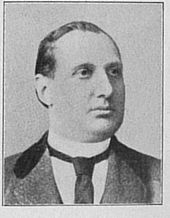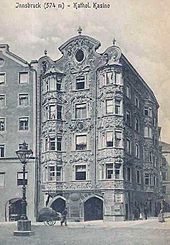Casino movement
The casino movement was a political-social movement within German Catholicism from the 1860s onwards.
Emergence
Casino companies as social associations for recreational activities, in which of course politics was also discussed, have existed in many German cities since the French Revolution .
They gained political significance in the atmosphere that was politically heated up by the so-called Baden Kulturkampf , a dispute between the Baden state and the Catholic Church in the 1850s and 1860s. At the Aachener Katholikentag in 1862, Catholics were advised to join together to form permanent communities. The businessman and later member of the Reichstag, Jakob Lindau, took this as an opportunity to found the first such “casino” (with “K”) in Heidelberg in the autumn of the same year , as a sociable association of Catholics who came together for discussion and lecture evenings.
Wanderkasino and Mannheimer Kasinosturm
The casinos gained a greater political moment from the resistance to the Baden School Supervision Act . This school dispute in Baden led to the plan in the Heidelberg casino to hold information events and meetings in other locations, which gave birth to the idea of the "Wandering Casino". The Wanderkasino defined itself as "an occasional gathering of men who see the School Act of July 29, 1864 as an attack on the rights of the Church and on the constitutional freedom of conscience, and who want to discuss the legal means to uphold both . "
On February 5, 1865, the traveling casino movement began with a meeting in Mosbach , whereupon numerous events with hundreds of visitors were held in the following weeks. At a time when television, radio and telephone did not yet exist, the liberal press dominated and the poorer classes could not afford a newspaper, such events were extremely important. Only through them could the church inform and mobilize the general public. Even the first casino rally in the Baden Lake District , which was deliberately not held in the liberal stronghold of Konstanz , but in Radolfzell on February 9, was infiltrated and massively disrupted by the liberals around the Constance state parliament member Carl Seiz . The Catholic speaker was interrupted several times and the gathering was eventually broken up by an attending civil servant who saw a threat to public safety and tranquility. In other places, too, attempts were made to prevent the casino events in this way, for which the expression "Radolfzellieren" was used, which the organizers tried to prevent by excluding non-Catholics from the events.
The dramatic climax of these disputes was the so-called Mannheim casino storm on February 23, 1865, which was a physical attack by liberal counter-demonstrators on a Catholic casino event. The actual event could not take place because the government had banned the use of the Mannheim churches as meeting places. The counter-demonstrators attacked the Catholic procession led by Jakob Lindau on the street and pursued them on their flight to Ludwigshafen, then in Bavaria . Some injuries occurred. The police, who had concentrated on blocking access to the churches, did not take action against the perpetrators.
"Conservative Opposition"
The Liberals considered the casino movement to be short-lived, which turned out to be a mistake. The Süddeutsches Evangelisch-Protestantisches Wochenblatt says that "the casino will soon have become an impossibility once the season has cured the farmer of his boredom."
The government's bans on assembly also remained ineffective, as elections to the district assemblies were due in Baden in 1865, which the Catholic party, which now often referred to as the “Conservative Opposition”, reinterpreted as a protest against school laws and other actual or alleged attacks by the liberal state has been. Candidates were put up and electoral meetings held, which as such could not be banned. Jakob Lindau, who was able to mobilize over 3000 participants in two of his election events, was particularly popular.
In addition, the clergy took political sides in an unprecedented way. For example, the Archbishop of Freiburg, Hermann von Vicari, called in a pastoral letter to only elect candidates who were known to be “independent outwardly, faithful to the church and conscientious” and who were familiar with the needs of the Catholic people. On August 9th, a “free conference” of the clergy in Freiburg called for consistent commitment to the Catholic candidates. This request was not only sanctioned by the archbishop in retrospect, but also expressly declared a priestly duty. The clerical commitment had an effect: of 169 citizens' representatives, around 25 were clergy and a further 60 were candidates who were loyal to the church, which means they were represented in all district assemblies and even represented a majority in one. In comparison, the liberals in the second chamber of the Baden state parliament of 1863 achieved an overwhelming majority of 86% of the seats.
This election result also came as a shock to the Liberals because they had previously believed that the Catholic opposition did not have broad popular support and only represented a small group of backward rural populations. It was also misunderstood that it was not only about church interests or a question of power in school politics, but also about the fact that the rural population perceived the consequences of liberal politics as a series of disadvantages that the Catholic "Freiburg Messenger" in a " List of Oppressions "summarized:
- Increase in government spending since 1860,
- strong increase in the number of civil servants with high salaries,
- costly new administrative and judicial organization,
- Freedom of trade,
- Freedom of movement,
- Marriage facilitation to the detriment of the communities,
- too far-reaching emancipation of Jews and
- the new cadastral survey with disadvantages for the landowners.
Social clubs
As a result, among other things, the casino movement gave rise to the Catholic People's Party , the forerunner of the Center Party in Baden as a political reservoir for the ultramontanes .
The “Catholic Casino” itself was largely depoliticized, embodied itself in registered associations and became a place of socializing primarily for members of the Catholic bourgeoisie, although the establishment of such casinos was not limited to Baden or southern Germany. Some of these clubs still exist today.
literature
- Ulrich Tjaden: Liberalism in Catholic Baden - history, organization and structure of the National Liberal Party of Baden 1869–1893. Dissertation Freiburg 2000, pp. 58-70 online
- Franz Dor: Jakob Lindau. A Baden politician and folk man portrayed in his life and work. With a foreword by Theodor Wacker. 3rd ed. Herder, Freiburg 1913, pp. 23-29
- Josef Becker : Liberal state and church in the era of the establishment of an empire and the culture war. History and structures of their relationship in Baden 1860-1876. Habil. Erlangen-Nürnberg 1968/69, Mainz 1973, pp. 141–152 and 195–198. Publications of the Commission for Contemporary History, Rh. B, Vol. 14.
Individual evidence
- ↑ Badischer Beobachter 41 (February 17, 1865): "On the handling of order in the wandering casinos"
- ↑ No. 6/1865, p. 36, cited by Tjaden, p. 64.
- ^ Bodies of local self-government created by the administrative reform of 1863, whose members were appointed, among other things, by general indirect elections.
- ↑ Quoted from Becker: Liberaler Staat, p. 144
- ↑ Tjaden, p. 67f

